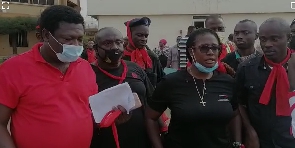The National Chairman of the General Transport Petroleum Chemical Workers Union of TUC, Bernard Owusu, has disclosed that as workers of the insolvent Tema Oil Refinery (TOR), they are opened for private partnerships to revamp the refinery.
He was speaking on Peace FM’s Kokrokoo in reaction to the series of demonstration being held by the workers of TOR over government’s inability to get the refinery running.
“That has been the discussion all this while that we want partnership. We are in for any avenue there is to explore to get the refinery up and running, the workers we are for it,” he said.
To get their wishes granted, the chairman stated that the government will just have to get the policies structure and they will be willing to have private people come in.
“All we require is that, the government will come up with policies to guide our work and enable us have crude oil to refine so we can also have some ‘chop money’ for our partners and children’s school fees,” he added.
Background:
The Tema Oil Refinery (TOR) workers have begun to embark on a series of actions, including picketing at the Jubilee House, to support their call for the revamping of the refinery.
Mr. Bernard Owusu, National Chairman of the General Transport Petroleum Chemical Workers Union (GTPCWU), announcing this in a press conference at the forecourt of TOR, said the industrial actions would precede the May Day celebrations.
Mr. Owusu said other workers would also picket at the premises of the Ministry of Energy and other strategic locations as several calls and meetings with management and government officials had yielded no result.
He said it was worrying that the refinery, which has the best engineers in the sub-region and has the capacity to refine 45,000 barrels a day, was only carrying finished products instead of fulfilling its core mandate of refining crude.
He questioned why Ghana has crude oil and yet TOR could not get crude to refine, adding that, almost all the companies created by Osagyefo Dr. Kwame Nkrumah Ghana’s First President has collapsed.
He said TOR workers would not allow that to happen to the refinery.
He reminded the government that if TOR was working at full capacity, it would supply the country with 50 percent of its overall domestic consumption, provide 100 percent of the residual fuel oil (RFO) for industrial operations, provide 20 to 25 percent of LPG consumption, and provide 100 percent of Aviation Turbine Kerosene (ATK).
The National Chairman of GTPCWU further said that on average, Ghana required about $4.8 billion to import petroleum products per year.
He said if TOR was producing, the forex requirement for petroleum product imports would significantly reduce by over 50 percent.
He said other benefits included the lowering of domestic ex-pump prices due to the removal of certain import charges, including the freight rate of about $92/Mt for petrol, $101/Mt for diesel, and $83/Mt for LPG.
He added that revamping TOR to work at full capacity would also lower the financing charges as these transactions were cedi denominated.
The Union observed that as Ghana was currently going through financial distress and a debt restructuring programme, significant benefits from TOR’s work should be top on the national agenda.
“Unless the managers of the country have no confidence in those, they have appointed to manage the TOR facility, the state is responsible and determines those who constitute the Board of Directors and the MD of TOR.
“Therefore, all past and current operational anomalies and challenges must be borne by the appointing authority of these key critical office holders, knowing very well that all operational controls are a function of management,” he added.
Mr. Anthony Koomson, Chairman of the Senior Staff Union, reminded the government that when TOR functions, it does not only benefit the staff but all Ghanaians and the economy.
Mr. Koomson said if the issue has to do with competent management, then the government must appoint the right people.
Meanwhile, watch the latest SayItLoud episode on GhanaWeb TV below:
NW/DA
General News of Wednesday, 19 April 2023
Source: www.ghanaweb.com













